|
|
|
Sort Order |
|
|
|
Items / Page
|
|
|
|
|
|
|
| Srl | Item |
| 1 |
ID:
136711
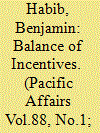

|
|
|
|
|
| Summary/Abstract |
This study is concerned with motivations driving North Korea’s interaction with the United Nations Framework Convention on Climate Change, drawing on information from treaty reporting documents, along with project reports compiled by international agencies and official statements released by the North Korean government. The article draws on causal inference to explore the hypothesis that the leadership perpetuation and state survival imperatives of the North Korean government represent the most likely explanation for North Korea’s interaction with the international climate change regime. It finds a strong probability that North Korea is utilising the UNFCCC as a capacity-building vehicle across its agricultural and energy sectors, a weak issue_images_88_1_Hydroelectric dam at Sinpyong (July 2012)_Habibpossibility that North Korea’s climate change vulnerability is a compelling incentive for greenhouse gas mitigation, and the weak possibility that North Korea is using the Clean Development Mechanism under the UNFCCC as a means for generating foreign currency revenue. The paper argues that the balance of incentives underpinning these motivations can be linked to the leadership perpetuation and state survival imperatives of the North Korean government.
|
|
|
|
|
|
|
|
|
|
|
|
|
|
|
|
| 2 |
ID:
120945
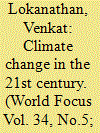

|
|
|
| 3 |
ID:
133111
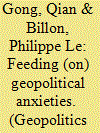

|
|
|
|
|
| Publication |
2014.
|
| Summary/Abstract |
This paper analyses the role of news media in (re)producing geopolitical narratives of food insecurity in relation to the 2007-2008 global food price spike. News content and textual analysis suggests that the media's representation of the food price spike is partly framed by Western geopolitical anxieties of the 'threatening rise of Asia', and features 'fast growing' Asian appetites among the main culprits of the crisis. Seeking to explain the widespread circulation of such representation, this paper analyses media-source relationship within the context of market-driven journalism, and suggests that the changing role of news media has in turn contributed to a rapid and uncritical circulation of elite-based interpretation of, and neoliberal geopolitical approach to, food security. The paper points at the importance of critical enquiries into geopolitical representations of food insecurity and of opening media space for a 'counter-geopolitics of food security'.
|
|
|
|
|
|
|
|
|
|
|
|
|
|
|
|
| 4 |
ID:
149489
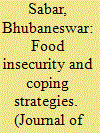

|
|
|
|
|
| Summary/Abstract |
This paper explores the food insecurity level and coping strategies of two particularly vulnerable tribal groups (PVTGs) in India. It finds that despite the availability of resources, limited income always becomes a proxy for their food vulnerability because they cannot purchase food items outside state programmes. These groups traditionally adopt various coping strategies to overcome food insecurity at household level and these have become a structure and behaviour for ensuring food security
|
|
|
|
|
|
|
|
|
|
|
|
|
|
|
|
| 5 |
ID:
175705
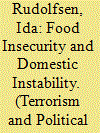

|
|
|
|
|
| Summary/Abstract |
Research on the relationship between food insecurity and unrest has a long history. The food price spikes in 2007–2008 and 2010–2011 coincided with demonstrations and incidents of large-scale violence, prompting renewed scholarly interest in the link between food insecurity and unrest. This paper reviews the literature, synthesises its main empirical findings and central explanations, and identifies four particular issues to consider to enhance our understanding of how food insecurity is related to unrest. First, there is a wide range of suggested theoretical mechanisms of how food insecurity is linked to unrest, but the empirical tests are akin. Second, there exist various notions of the independent variable, but there is a gap between the theoretical definition and measurement. Third, the focus is often on “food riots”, but whether rioting is the most likely response, and whether it is possible to separate between “food-related” unrest and other types of turmoil is unclear. Lastly, there is a challenge to address the endogenous nature of food insecurity and unrest. The paper adds to the literature by pointing to the theoretical mechanisms linking food insecurity to unrest, relating both to the type and degree of food insecurity, and how we understand and define unrest.
|
|
|
|
|
|
|
|
|
|
|
|
|
|
|
|
| 6 |
ID:
091382


|
|
|
| 7 |
ID:
091801


|
|
|
|
|
| Publication |
2009.
|
| Summary/Abstract |
The world is facing the worst food crisis since the 1970s. According to the UN Food and Agriculture Organisation (FAO), about 862 million people are afflicted with hunger and malnutrition.
|
|
|
|
|
|
|
|
|
|
|
|
|
|
|
|
| 8 |
ID:
110331


|
|
|
| 9 |
ID:
133110


|
|
|
|
|
| Publication |
2014.
|
| Summary/Abstract |
The impacts of recent food, financial, and energy crises have reinvigorated a geopolitical enframing of global food security that makes foreign development assistance a primary component of national security strategies. This centres elite fears of hunger and underdevelopment and strongly shapes policies and strategies adopted in response. Geopolitical fears of hungry and food insecure populations are compounded by the politics of austerity and cuts to foreign aid budgets and social spending. This paper examines the geopolitics of food security, fear, and austerity as expressed in the rhetoric and strategies of major aid donor governments, especially the US and UK, and proposes an alternative geopolitics that builds from the affective dimensions of hunger, food insecurity, and vulnerability as experienced by the hungry and poor. The example of farmer suicides and agrarian political mobilisation in India demonstrates how this affective alternative geopolitics may be constructed and examined.
|
|
|
|
|
|
|
|
|
|
|
|
|
|
|
|
| 10 |
ID:
133116


|
|
|
|
|
| Publication |
2014.
|
| Summary/Abstract |
This paper draws from research on small-scale maize production in Mexico's Central Highland region to discuss the geopolitical implications of everyday agricultural practices. An overwhelming majority of maize farmers in this region, as well as in the country more broadly, continue to cultivate locally adapted maize varieties they have bred themselves - criollo maize is the vernacular term - despite decades of concerted government attempts to effect the widespread adoption of commercially bred and licensed hybrid varieties. This state effort to restructure agricultural systems and food security according to nationalist and capitalist priorities is one tactic in a long and violent struggle for control over peasant land and labour in Mexico. By integrating feminist scholarship in geopolitics and in political ecology, I am following the lead of geographers who regard the materialities of everyday life as a foundation for political tensions and conflicts that are constantly unfolding along intersecting lines of difference. Though geopolitics has rarely turned its attention directly to theories of intimate socio-ecological relations, I argue that the field has much analytical and political leverage to gain by engaging with political ecology, and that feminist geographic imaginaries provide a crucial space in which to do so. This approach allows for an analysis of how a dominant geopolitics of land and agriculture is being undermined through the routine production of criollo maize, revealing new potential for creating broad political alliances with social movements that are currently working toward alternative visions of agriculture and food security.
|
|
|
|
|
|
|
|
|
|
|
|
|
|
|
|
| 11 |
ID:
133109
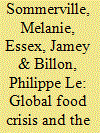

|
|
|
|
|
| Publication |
2014.
|
| Summary/Abstract |
Growing anxieties over food security have recently brought sharp geopolitical overtones to debates about the agro-food sector. Contending that this 'geopolitical moment' highlights the mutually constitutive nature of geopolitics and political economies of food, we examine how dominant geopolitical framings of food security extend and deepen neoliberal models of agro-food provisioning, and highlight the need for further attention to these dynamics from political geographers. We develop a preliminary research agenda for further work in the field, focusing on the recent spate of global farmland acquisitions, questions of agro-food governance, the securitisation of hunger and obesity, and the environmental impacts of dominant agro-food systems. Throughout, we highlight the value of a counter-geopolitics of food security for re-situating agro-food politics outside hegemonic policies and institutions, and of the alter-geopolitics of food pursued by communities embodying concrete alternative food production and consumption systems.
|
|
|
|
|
|
|
|
|
|
|
|
|
|
|
|
| 12 |
ID:
133117


|
|
|
|
|
| Publication |
2014.
|
| Summary/Abstract |
The dramatic expansion of large-scale economic land concessions and acquisitions in the Global South has generated considerable concern amongst activists, journalists and academics recently. This has led to the increased prevalence of the term 'global land grabbing', which I argue represents a particular type of meta-narrative. In this article the global land grab meta-narrative is considered in relation to recent land alienation of Indigenous Peoples in the northeastern Cambodia province of Ratanakiri. While land grabbing is certainly a crucial problem, it is insufficient to explain the circumstances in Ratanakiri or in Cambodia more generally as 'global land grabbing'. While foreign capital is associated with land grabbing in Cambodia, there are various other factors that also require consideration. Specifically, the role of Asian money laundering and elite capture requires increased attention. This article contributes to better understanding the particular ways that land dispossession plays out in particular places and contexts.
|
|
|
|
|
|
|
|
|
|
|
|
|
|
|
|
| 13 |
ID:
173888
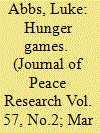

|
|
|
|
|
| Summary/Abstract |
Nonviolent movements are more successful when mobilizing large and diverse numbers of participants. However, while there has been considerable research on the outcomes of nonviolent campaigns, far less is known about the initial emergence of nonviolent action. A growing literature suggests ethnic divisions may undermine the ability of activists to engage in mass nonviolent mobilization across diverse social lines. Yet many large and diverse nonviolent movements have successfully emerged in various ethnically divided societies across the world. I argue that nonviolent mobilization is made possible in ethnically polarized contexts when broader cross-cutting grievances are present as they enable local activists to widen their appeal across social lines. I focus on food price spikes as an example of a cross-cutting issue that is likely to affect consumers from different ethnic groups. The unique and symbolic nature of food price spikes facilitates nonviolent mobilization across ethnic lines and provides clear short-term incentives for many people to participate in protests against the government. Using new spatially disaggregated data on government targeted nonviolent action, I analyse grid-cell years across 41 African countries (1990–2008). I find strong evidence that food price spikes increase the likelihood of nonviolent action in politically excluded and ethnically diverse locations.
|
|
|
|
|
|
|
|
|
|
|
|
|
|
|
|
| 14 |
ID:
173986
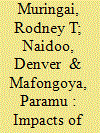

|
|
|
|
|
| Summary/Abstract |
Small-scale fisheries play a significant role as a source of employment, livelihood strategy and contributor to food security. However, changes in climatic variables alter the productivity and distribution of marine and freshwater fish species, negatively affecting the livelihoods of fishery-dependent communities. This study seeks to identify small-scale fishers’ livelihoods and examine the impacts of climate change on livelihoods and food security of small-scale fishing households. The study was conducted in Sanyathi fishing basin in Lake Kariba, Zimbabwe. The Sustainable Livelihood Approach framework of the Department for International Development was used to define the small-scale fishers’ livelihood assets and activities. The study employed a mixed-method approach for data collection. A pretested, semi-structured questionnaire, focus group discussions and observations were used to collect data from the small-scale fishers. The data collected were subjected to descriptive and bivariate analysis. The present results indicate that fishing is the community’s primary livelihood activity. More than 62% of fishermen stated that fishing revenue is declining, owing to declining fish catches. Of participants, 98% recognised food purchases as the primary source of food. Therefore, 78% of the small-scale fishers perceive their households to be food insecure due to declining incomes from fisheries. These findings show the need for policymakers and development agencies to formulate strategies that specifically target fishing communities whose livelihoods rely on natural ecosystems.
|
|
|
|
|
|
|
|
|
|
|
|
|
|
|
|
| 15 |
ID:
133108
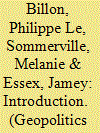

|
|
|
|
|
| Publication |
2014.
|
| Summary/Abstract |
This special issue of Geopolitics focuses on recent shifts in the geopolitics of agro-food systems linked to debates around a new 'Global Food Crisis' and its implications for (trans)national political agendas. Spurred since 2006 by rising food prices, large-scale farmland acquisitions, and growing public protests, these concerns have motivated new streams of development assistance and reforms to global governance processes, as well as strengthened activism by agrarian social movements. While governments and civil society organisations have struggled with how best to address the realities of worsening food insecurity, the discourse of crisis has simultaneously helped to actively reposition food security as an object of urgent geopolitical calculation and strategy. The stubborn grip of continuing poverty and hunger has prompted many observers to envision a future in which chronic food insecurity and associated political and economic disorder are the new normal.
|
|
|
|
|
|
|
|
|
|
|
|
|
|
|
|
| 16 |
ID:
148475


|
|
|
|
|
| Summary/Abstract |
Food insecurity occurs when people do not have secure access to food necessary for a healthy life. The food-insecure are typically the poor, and the traditional focus of food insecurity thinking has been the global poor. Increasingly, it is being recognized that in the rich world, food insecurity manifests itself in calorie-rich but nutrient-poor diets, leading to the linkage between poverty, obesity and its associated health problems. Furthermore, the historical link between income and diets, when projected forwards, shows a growth in demand that would be extremely challenging to meet with sustainable production. This is especially true given that emissions from the food system are significant contributors to climate change, perhaps more so than any other sector; and yet, probably less than half the world's calories are used directly for healthy diets (over half of agricultural production is lost or wasted, fed to animals or consumed in excess of healthy requirements). This review article, of a suite of four books, covers the way the food security argument is framed and how this is changing, food politics and justice and why our food system is as it is. The overall conclusion is that our food system is placing unsustainable demands on the planet, as well as creating injustice and inequity. The ‘productivist paradigm’ of growing ‘ever more, ever more cheaply’ while relying on international commodity trade and markets to solve the distributional issues, is unlikely to create a sustainable, just and food-secure world.
|
|
|
|
|
|
|
|
|
|
|
|
|
|
|
|
| 17 |
ID:
133114


|
|
|
|
|
| Publication |
2014.
|
| Summary/Abstract |
Enclosure, dispossession and displacement loom large in current debates about the recent boom in transnational farmland deals, and about Chinese agribusiness for export in particular. Often under-examined, however, are the ways that legacies of geopolitical conflict shape the inevitably uneven distribution of enclosure, dispossession and displacement. This paper constructs a case of these 'micro-geopolitical' legacies by examining a Chinese rubber planting 'promotion' project in northwestern Laos's emerging 'Golden Quadrangle' development region. It argues that longstanding concerns about security inform the ways that local authorities deploy investment projects that are otherwise seen as examples of 'foreign' land grabbing. Further, it shows that while the geographical aims of foreign agribusiness mesh with state-mediated resettlement efforts (a darker spin on the narrative of 'win-win' cooperation), these activities often precede current land deals rather than result from them. Chinese agribusiness in Laos's upland interior thus appears less as a driver of displacement than a means for attempting to secure in place a particular (if precarious) configuration of population and security.
|
|
|
|
|
|
|
|
|
|
|
|
|
|
|
|
| 18 |
ID:
120921
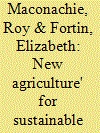

|
|
|
|
|
| Publication |
2013.
|
| Summary/Abstract |
In sub-Saharan Africa, commercial bioenergy production has been hailed as a new form of 'green capitalism' that will deliver 'win-win' outcomes and 'pro poor' development. Yet in an era of global economic recession and soaring food prices, biofuel 'sustainability' has been at the centre of controversy. This paper focuses on the case of post-war Sierra Leone, a country that has over the last decade been consistently ranked as one of the poorest in the world, facing food insecurity, high unemployment and entrenched poverty. Following a recent government strategy to secure foreign direct investment in biofuels production in agriculturally rich regions of the country, the largest foreign investment in Sierra Leone since the end of its civil war has been secured: a Swiss company is to invest US$368 million into a large-scale biofuels project over the course of 3 years, and promises to simultaneously stimulate an enabling environment for investment, provide job opportunities for youth and increase food production. For multiple actors involved in the project, the concept of 'sustainability' is crucial but accordingly there are varying interpretations of its meaning. Such differences in interpretation and the complex contradictions within discourses of sustainability are in turn framed by the various scales within which these actors are situated. While attempts have been made to manage these contradictions through global sustainability standards, the unequal power relations between different actors will ultimately determine the ways in which they are likely to be resolved. The paper concludes by reflecting on how these processes may be contributing to a changing governance landscape and wider global political economy within which bioenergy is being produced, processed and consumed.
|
|
|
|
|
|
|
|
|
|
|
|
|
|
|
|
| 19 |
ID:
124756
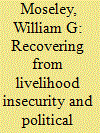

|
|
|
|
|
| Publication |
2013.
|
| Summary/Abstract |
Northern Mali has experienced political instability and a humanitarian crisis since a March 2012 coup d'état, subsequent rebellion and French military intervention. Rebuilding livelihood security in this region will be a key policy objective after a new government has been elected and donor assistance has returned. This policy brief reviews key background on rural livelihoods in northern Mali before exploring current food insecurity in the region as affected by internally displaced people, limited mobility, climate variability, and Tuareg separatism. The article also examines strategies for rebuilding rural livelihoods in the region, from broader security and political initiatives to grassroots interventions.
|
|
|
|
|
|
|
|
|
|
|
|
|
|
|
|
| 20 |
ID:
125775
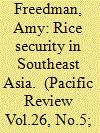

|
|
|
|
|
| Publication |
2013.
|
| Summary/Abstract |
High commodity prices in 2007-2008 and again in 2011, particularly for crops such as rice and corn, have forced countries in Southeast Asia to look more closely at their agricultural and trade policies for rice and grains. While all countries in the region are heavily dependent on rice for food security, there is significant variation in countries' abilities to be self-sufficient in rice production. This paper examines the factors that contribute to food insecurity in SEA, which communities are hit hardest, and the diversity of responses to this situation. And, the paper asks what the prospects might be for greater cooperation in coordinating rice (and other crops more generally) policies so as to better ensure reliable access for more citizens in the region. Thailand, Vietnam, and Cambodia are all major exporters of rice; whereas Indonesia, Malaysia, Singapore, and the Philippines are all importers of rice. Since the sharp spike in prices in 2008, countries which import rice have developed more comprehensive plans to become self sufficient in rice production. Individual country's policies will have dramatic effects on regional trade relations and dynamics. There have been some regional attempts to create a more cooperative framework for addressing food security, but these efforts have not yet played a significant role in reshaping domestic policies. This paper will assess the chances of further cooperation and success (or the chance of failure and less engagement) in the future.
|
|
|
|
|
|
|
|
|
|
|
|
|
|
|
|
|
|
|
|
|